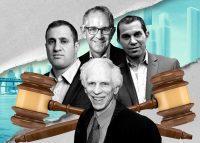A judge has sided with a small-time Airbnb host against the city in a case that could narrow the de Blasio administration’s crackdown on short-term rentals.
In a decision handed down Friday, Justice Arthur Engoron ruled in favor of Stanley Karol, a Brooklynite who was fined for a series of code violations including using his home for illegal occupancy.
Karol, who lives at the property and sometimes rents out the basement unit, had claimed the action was retaliation for his advocacy in support of Airbnb.
The judge said owners of one- and two-family homes were legally entitled to rent out their properties for short-term stays. He ordered the city to return more than $4,000 in fines Karol had paid.
“In sum, I say, ‘Leave the poor guy alone,’” Engoron wrote.
Read more



The judgment offers some clarity on a contentious issue. A state law prohibits renting out a dwelling for fewer than 30 days unless an owner or tenant is present, but does not apply to one- and two-family homes. However, the Mayor’s Office of Special Enforcement, or OSE, regularly fined small homeowners for violations associated with such rentals, data obtained by The City last year showed.
Despite assurances by Mayor Bill de Blasio that enforcement would focus on apartment buildings being used as de facto hotels, OSE regularly showed up at small homes listed on Airbnb. If they were being rented for short-term stays, they were slapped with violations for not meeting building and administrative codes applicable to apartment buildings.
The City reported that about one-third of the crackdown’s fines in the outer boroughs were levied against small homeowners. In Brooklyn they were fined more than $2.1 million and in Queens $1.7 million — or 39 percent of the borough’s total. Small homeowners in the Bronx and Staten Island accounted for more than half of the fines.
“What this decision does in many ways — assuming it is upheld on appeal — is a bit of a game-changer in how I think OSE is going to have to approach enforcement,” said Brad Green, an attorney specializing in code violations who worked on the Karol case.
In a statement to The Real Deal, a spokesperson for the city’s Law Department said the decision misinterpreted the law. “We are confident it will be overturned on appeal,” the statement added.
Airbnb, while not a direct party to the suit, is paying Karol’s legal fees. The dispute is only a small piece of a much larger regulatory fight it has been waging for years with the de Blasio administration.
Both parties are currently in talks about settling a lawsuit Airbnb filed in 2018 to block a city ordinance that would require it to hand over data about its hosts.
The city wants the data so it can better identify the listings that violate regulations — de Blasio has pointed to entire buildings operating as “illegal hotels” — but Airbnb has pushed back, arguing that the disclosure would violate users’ privacy.
This February, a judge agreed to put the case on hold, a move that prompted the city to issue a subpoena demanding the company hand over the information.
“We want to make sure that something that is supposed to be an occasional business is not a full-time business, which would mean it should be listed as a business,” the mayor told NY1 Spectrum news. “People want to know what the hell is going on.”
Opponents say that isn’t the full story. “While the city has claimed the enforcement focus is operators of illegal hotels, they’ve consistently gone after Skip Karol and people like him,” said Debbie Greenberger, of law firm Emery Celli Brinkerhoff and Abady, who represented Karol.
While the city has consistently drawn attention to commercial operators using the platform, Airbnb has spent millions to offset the message by showcasing regular homeowners.
Last year, Airbnb spent more than $4 million on an opposition campaign against short-term rental restrictions in Jersey City, a relatively small market that holds greater significance because of its proximity to New York.
Despite the outsized spend and a grassroots-style campaign fronted by hosts, the public voted overwhelmingly in favor of the restrictions — a blow to the home-sharing platform as it geared up for a planned initial public offering this year.
With two levels of appeal pending, it will be months before it is clear what influence the decision will have — if any — over the city’s short-term rental policy. De Blasio is strongly supported by the Hotel Trades Council, a union for hotel workers that has been at war with Airbnb for years because the online platform competes with hotels that employ union members. The mayor and other advocates for affordable housing also say Airbnb rentals make apartments unavailable for tenants, exacerbating the housing shortage.
But Airbnb says its rentals help ordinary New Yorkers pay their bills and stay in their homes.
Write to Sylvia Varnham O’Regan at so@therealdeal.com
